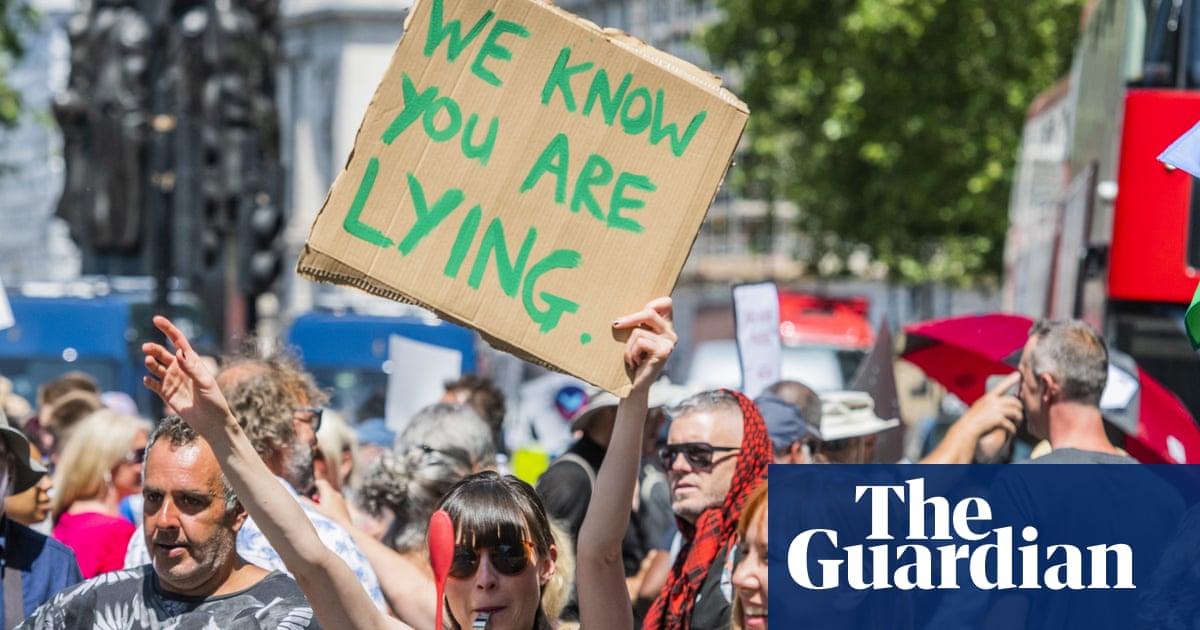How British politics got hijacked by conspiracy theories | Letters - 3 minutes read

Re John Harris’s article (Conspiracy theories are festering – and our politicians are making it worse, 18 June), the idea that “the world is controlled by a secretive elite” may be a conspiracy theory, but you only have to change “elite” to “elites” for it to be, in essence, true. The governments of China and Russia are surely secretive elites. And are the governments of, say, the US and Britain (with their flawed systems of democracy, their governments formed by political parties funded by wealthy donors, supported by media owned by reclusive billionaires, beset by lobbyists, and served by administrative machines as opaque as they can keep them) really such paragons of transparency and honesty?
The day before Harris’s article you published an obituary of the US whistleblower Daniel Ellsberg, who revealed that “everything that the American public had been told … about the Vietnam war … was false”. Of course, Britain has its Freedom of Information Act, introduced by Tony Blair, who later said he regretted it. All governments are obsessed with secrecy, and all governments are, by definition, elites. Simon Wilson London
One of the ironies of conspiracy theories such as “the world is controlled by a secretive elite” is that the real elite are hiding in plain sight. More than that, they want to be seen as victims. The home secretary, Suella Braverman, at the National Conservatism conference railed against “self-appointed gurus, experts and elites who think they know best what is in the public’s interest”. When those who claim to oppose inequality merely suggest tinkering at the edges and warn that nothing else will be possible, people lose any belief that challenging class injustice is achievable. Conspiracy theories are the end result.
The consequence is a politics that is the opposite of what it claims to represent. Donald Trump tells his working-class supporters: “They’re not coming after me, they’re coming after you – and I’m just standing in their way.” If the elite rant about Marxist mobs and “woke blobs”, and the centre-left believe the elite are untouchable, then people either resign themselves to Labour’s technocratic “fiscal straitjacket” or they come to believe that a secret elite runs the game. Nothing changes either way. Nick Moss London
I have often wondered why people become comfortable or satisfied with conspiracy theories. I can’t help linking it to our children’s education. We tell them there are unseen centres of power observing and interfering with their lives, from certain deities to Father Christmas and the tooth fairy. These all require the suspension of disbelief and the reinterpretation of events as evidence of hidden power at work. We set human brains up as fertile ground for conspiracy. Tom Hutchison Bath
I share John Harris’s concern about conspiracy theories. They appeal to those often living in denial, who either can’t or don’t want to think rationally. Schools have an important role to play in fostering critical thinking, exposing the danger posed by conspiracy theories and confronting those that crop up in the classroom. Stan Labovitch Windsor, Berkshire
To those readers alarmed by the proliferation of conspiracy theories and their growing influence, can I suggest that they read Conspiracy by Tom Phillips and Jonn Elledge. The chapter on pandemics is most illuminating. The subtitle, A History of Boll*cks Theories, and How Not to Fall for Them, tells the reader all they need to know about the content. Alan Steedman Thingwall, Wirral
Have an opinion on anything you’ve read in the Guardian today? Please email us your letter and it will be considered for publication in our letters section.Source: The Guardian
Powered by NewsAPI.org